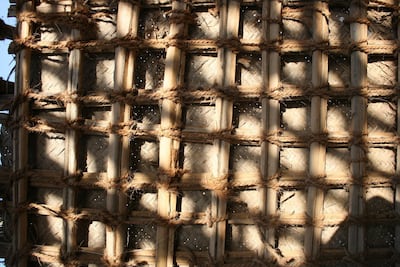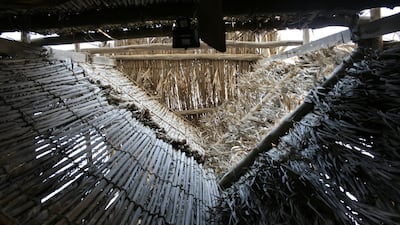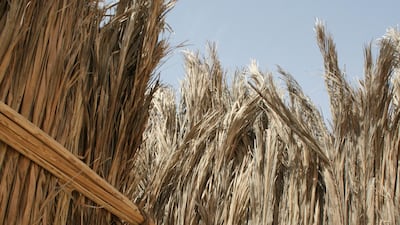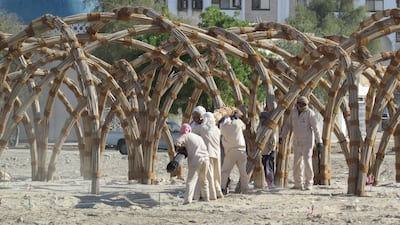Venerated in the Gulf, the date palm has offered the region's inhabitants food, shade and shelter for millennia. In a pandemic-stricken world facing climate change, it may still have more to give, says architect Sandra Piesik.
Piesik, who is also a researcher and author, has been studying the subject of arish – or palm-leaf architecture – since 2008. For years she has been advocating for the return of arish and the use of traditional technologies in constructing buildings and structures. Now more than ever, she says, such shifts towards vernacular architecture, which focuses on indigenous materials, can steer the Middle East towards a more sustainable future.
On Monday, Piesik will participate in Tashkeel's Live Lectures series to outline the role of art and design in rebuilding a post-pandemic society. The lecture, titled Date Palm Universe in the Post-Covid-19 World, will explore how arish and vernacular architecture can aid a global green recovery.
“The UAE has 42 million date palm trees, and there are other similar materials that grow in the Arabian Peninsula and North Africa,” Piesik says, and that each could produce 10 to 25 dried palm leaves every year. Instead of being treated as agricultural waste, as it is now, these can be used as raw materials for arish structures.
“It’s important because we need to find new ways of using this material today that respond to the social aspirations of the people of the UAE and the region,” she says. Looking to the UAE’s past, Piesik cites an archaeological site on Delma Island, off the coast of Abu Dhabi. Once a centre for pearl trading in the Gulf, it is also the location of a 7,000-year-old house made from palm trunks.
“The Middle East was doing something environmentally friendly 7,000 years ago. People responded in a very ingenious way to their landscape,” she says. The material helped with the extreme heat, reflecting the sun 50 per cent better than concrete and glass.
In the 1950s, arish was a common facet of the urban landscape in the Gulf. Building houses from palm leaf was a community affair, with tribes and families working together to complete the residences. “The biggest capacity of scale you could see in pictures of Dubai and Abu Dhabi from the 1950s had 4,000 family houses housing 12,000 people in Dubai, and about 800 houses in Liwa.”
With the discovery of oil, the UAE sped up its progress and reshaped its architectural identity. Over the years, arish fell out of favour as materials such as concrete, glass and steel dominated construction projects. “It was a social transition, I think. It’s seen everywhere, what we call modernisation,” Piesik says.
Arish also fell behind in terms of innovation. “The material itself has not undergone stylistic changes and technological evolution. The material is not durable compared to concrete,” she explains.
Its revival will need effort and time. Traditional materials, such as bamboo, have been able to stay relevant in contemporary use because of testing and research. Piesik hopes arish will follow the same path.
A boost in research and development will allow architects and designers to understand the material’s strengths and appropriate uses. This includes analysis and testing in laboratories, as well as more educational resources for practitioners. “It needs to be owned by an organisation at the national level to ensure that this knowledge is not stopped and it stays with the nation and the region,” she says.
Most of the craftspeople who have perfected the use of arish, some of which Piesik interviewed for her book on the subject titled Arish: Palm-Leaf Architecture, have died. It is up to the younger generation to develop hybrid solutions to ensure that the knowledge doesn't disappear completely.
“Artists and the creative industry need to be the co-creators of this new post-Covid-19 story, with a full understanding of what the material of arish is doing environmentally and what this material can do for the authentic culture of the community,” Piesik says.
“There is no doubt that we could re-engage arish today, but it takes time. It is a journey that we need to do together, led by local people and local communities. It is also the story of vernacular architecture, of the planet. It’s a story of humanity, I think."
By speaking to more creatives and promoting “cultural continuity”, she hopes to see a resurgence in a practice that was once so vital for Emiratis and remains invaluable to the UAE’s heritage.
More information on Sandra Piesik's online lecture is available on Tashkeel's website
Springsteen: Deliver Me from Nowhere
Director: Scott Cooper
Starring: Jeremy Allen White, Odessa Young, Jeremy Strong
Rating: 4/5
The Vile
Starring: Bdoor Mohammad, Jasem Alkharraz, Iman Tarik, Sarah Taibah
Director: Majid Al Ansari
Rating: 4/5
The specs
Engine: 2.0-litre 4-cylinder turbo
Power: 240hp at 5,500rpm
Torque: 390Nm at 3,000rpm
Transmission: eight-speed auto
Price: from Dh122,745
On sale: now
'HIJRAH%3A%20IN%20THE%20FOOTSTEPS%20OF%20THE%20PROPHET'
%3Cp%3E%3Cstrong%3EEdited%20by%3A%3C%2Fstrong%3E%20Idries%20Trevathan%3Cbr%3E%3Cstrong%3EPages%3A%3C%2Fstrong%3E%20240%3Cbr%3E%3Cstrong%3EPublisher%3A%3C%2Fstrong%3E%20Hirmer%20Publishers%3Cbr%3E%3Cstrong%3EAvailable%3A%3C%2Fstrong%3E%20Now%3C%2Fp%3E%0A
Other acts on the Jazz Garden bill
Sharrie Williams
The American singer is hugely respected in blues circles due to her passionate vocals and songwriting. Born and raised in Michigan, Williams began recording and touring as a teenage gospel singer. Her career took off with the blues band The Wiseguys. Such was the acclaim of their live shows that they toured throughout Europe and in Africa. As a solo artist, Williams has also collaborated with the likes of the late Dizzy Gillespie, Van Morrison and Mavis Staples.
Lin Rountree
An accomplished smooth jazz artist who blends his chilled approach with R‘n’B. Trained at the Duke Ellington School of the Arts in Washington, DC, Rountree formed his own band in 2004. He has also recorded with the likes of Kem, Dwele and Conya Doss. He comes to Dubai on the back of his new single Pass The Groove, from his forthcoming 2018 album Stronger Still, which may follow his five previous solo albums in cracking the top 10 of the US jazz charts.
Anita Williams
Dubai-based singer Anita Williams will open the night with a set of covers and swing, jazz and blues standards that made her an in-demand singer across the emirate. The Irish singer has been performing in Dubai since 2008 at venues such as MusicHall and Voda Bar. Her Jazz Garden appearance is career highlight as she will use the event to perform the original song Big Blue Eyes, the single from her debut solo album, due for release soon.
Groom and Two Brides
Director: Elie Semaan
Starring: Abdullah Boushehri, Laila Abdallah, Lulwa Almulla
Rating: 3/5
Company profile: buybackbazaar.com
Name: buybackbazaar.com
Started: January 2018
Founder(s): Pishu Ganglani and Ricky Husaini
Based: Dubai
Sector: FinTech, micro finance
Initial investment: $1 million
The specs: 2018 Renault Megane
Price, base / as tested Dh52,900 / Dh59,200
Engine 1.6L in-line four-cylinder
Transmission Continuously variable transmission
Power 115hp @ 5,500rpm
Torque 156Nm @ 4,000rpm
Fuel economy, combined 6.6L / 100km
Tributes from the UAE's personal finance community
• Sebastien Aguilar, who heads SimplyFI.org, a non-profit community where people learn to invest Bogleheads’ style
“It is thanks to Jack Bogle’s work that this community exists and thanks to his work that many investors now get the full benefits of long term, buy and hold stock market investing.
Compared to the industry, investing using the common sense approach of a Boglehead saves a lot in costs and guarantees higher returns than the average actively managed fund over the long term.
From a personal perspective, learning how to invest using Bogle’s approach was a turning point in my life. I quickly realised there was no point chasing returns and paying expensive advisers or platforms. Once money is taken care off, you can work on what truly matters, such as family, relationships or other projects. I owe Jack Bogle for that.”
• Sam Instone, director of financial advisory firm AES International
"Thought to have saved investors over a trillion dollars, Jack Bogle’s ideas truly changed the way the world invests. Shaped by his own personal experiences, his philosophy and basic rules for investors challenged the status quo of a self-interested global industry and eventually prevailed. Loathed by many big companies and commission-driven salespeople, he has transformed the way well-informed investors and professional advisers make decisions."
• Demos Kyprianou, a board member of SimplyFI.org
"Jack Bogle for me was a rebel, a revolutionary who changed the industry and gave the little guy like me, a chance. He was also a mentor who inspired me to take the leap and take control of my own finances."
• Steve Cronin, founder of DeadSimpleSaving.com
"Obsessed with reducing fees, Jack Bogle structured Vanguard to be owned by its clients – that way the priority would be fee minimisation for clients rather than profit maximisation for the company.
His real gift to us has been the ability to invest in the stock market (buy and hold for the long term) rather than be forced to speculate (try to make profits in the shorter term) or even worse have others speculate on our behalf.
Bogle has given countless investors the ability to get on with their life while growing their wealth in the background as fast as possible. The Financial Independence movement would barely exist without this."
• Zach Holz, who blogs about financial independence at The Happiest Teacher
"Jack Bogle was one of the greatest forces for wealth democratisation the world has ever seen. He allowed people a way to be free from the parasitical "financial advisers" whose only real concern are the fat fees they get from selling you over-complicated "products" that have caused millions of people all around the world real harm.”
• Tuan Phan, a board member of SimplyFI.org
"In an industry that’s synonymous with greed, Jack Bogle was a lone wolf, swimming against the tide. When others were incentivised to enrich themselves, he stood by the ‘fiduciary’ standard – something that is badly needed in the financial industry of the UAE."
Elvis
%3Cp%3E%3Cstrong%3EDirector%3A%3C%2Fstrong%3E%20Baz%20Luhrmann%3C%2Fp%3E%0A%3Cp%3E%3Cstrong%3EStars%3A%3C%2Fstrong%3E%20Austin%20Butler%2C%20Tom%20Hanks%2C%20Olivia%20DeJonge%3C%2Fp%3E%0A%3Cp%3E%3Cstrong%3ERating%3A%3C%2Fstrong%3E%204%2F5%3C%2Fp%3E%0A
Key findings
- Over a period of seven years, a team of scientists analysed dietary data from 50,000 North American adults.
- Eating one or two meals a day was associated with a relative decrease in BMI, compared with three meals. Snacks count as a meal. Likewise, participants who ate more than three meals a day experienced an increase in BMI: the more meals a day, the greater the increase.
- People who ate breakfast experienced a relative decrease in their BMI compared with “breakfast-skippers”.
- Those who turned the eating day on its head to make breakfast the biggest meal of the day, did even better.
- But scrapping dinner altogether gave the best results. The study found that the BMI of subjects who had a long overnight fast (of 18 hours or more) decreased when compared even with those who had a medium overnight fast, of between 12 and 17 hours.













